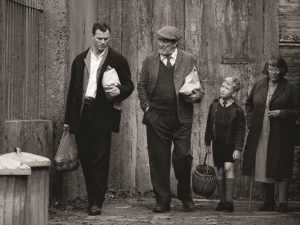The title of Jane Campion’s haunting new film, The Power of the Dog (streaming on Netflix), comes from Psalm 22 in the Bible, which reads (in the King James version), “Deliver my soul from the sword; my darling from the power of the dog.” The line is generally understood to be in the voice of King David, and “the dog” to metaphorically represent a pack of enemies, or Satan.

But good and evil are not clearly separated in Campion’s adaptation of Thomas Savage’s novel, a bleak Western fable set in 1925 Montana. In it, Rose Gordon (Kirsten Dunst) is a widow struggling to survive since her late husband, an alcoholic doctor, left her and her delicate teenage son, Peter (Kodi Smit-McPhee), with little to sustain them. Wealthy rancher George Burbank (Jesse Plemons) takes a shine to Rose, and they are married. When she and Peter move to George’s spread, they must deal with George’s brother, Phil (Benedict Cumberbatch), the de facto master of the ranch and a self-styled cowboy bachelor who resents the intrusion of newcomers to the family. Rose consequently takes to drink, and Peter, who is painfully thin, bookish, and homely, must confront Phil’s macho-naturalist bullying on his own.
The film, ravishingly shot by Ari Wegner in New Zealand (where Campion is from, having joined the Australian New Wave after college), is a slow-moving and poetic meditation on the true nature of individual strength. Campion, as she proved in The Piano, uses the slow reveal to brilliant effect, and performances by the entire cast are indelible. Everything smolders under the golden sun and behind deep shadows: George’s desire for Rose; Rose’s anxiety over Phil; Phil’s repressed homosexual fixation on young Peter. The only one among them who appears nonplussed by it all is Peter, who silently endures ceaseless teasing and testing by Phil and his ranch hands. The dramatic tension resolves itself with a moral twist on the prophecy from another Psalm — that “the meek shall inherit the Earth.” Exactly who the meek are in this story has become moot.

There is nothing hidden in Lin-Manuel Miranda’s splendiferous, loving film adaptation of Tick, Tick… Boom! (streaming on Netflix), the autobiographical one-man revue that Jonathan Larson created for himself in the years leading up to the fruition of his magnum opus, Rent, and his death at age 35 in 1996 from a congenital heart defect.
Larson, played with pitch-perfect charm by Andrew Garfield, is ingratiating, infuriating, manic, self-aware, and overflowing with talent, a musical theater man-child who struggles mightily to get his work performed. He frustrates his dancer girlfriend while making ends meet as a waiter in a downtown Manhattan diner. His journey is wound up tight and full of suspenseful roadblocks, even though Larson’s fate, good and bad, is a given.
Miranda loads each sequence and song with fizzy theatricality, locating them behind the scenes in show-biz New York and populating them with marvelous supporting parts — Robin de Jesús as Larson’s friend, Judith Light as his absentee agent, and Bradley Whitford as his idol and mentor, Stephen Sondheim — as well as theater celebrity cameos (Chita Rivera, Bernadette Peters, Joel Grey, Brian Stokes Mitchell, Beth Malone, André De Shields, Bebe Neuwirth, and the original cast of Rent, to name a few). It’s a cluttered quilt of a narrative, but, thanks to Miranda, it all works seamlessly.

Kenneth Branagh’s Belfast, which played in theaters locally and is now available to rent (for $19.99) on AppleTV, Amazon Prime, and other sites, is a black-and-white memoir of the filmmaker’s childhood — and fall from innocence — in Northern Ireland, when the Troubles arrived in the late ’60s.
Branagh’s stand-in in this semi-fictional account is Buddy (Jude Hill), a nine-year-old towheaded Protestant boy who lives on a quiet Belfast street with his Ma and Pa (a sexy and poignant Caitríona Balfe and Jamie Dornan), older brother (Lewis McAskie), and paternal grandparents (Ciarán Hinds and Judi Dench, offering warmth and gravitas). Suddenly, and with eerie virulence, resentment and hatred grow against the Catholics living in their midst. To quell the rioting, British soldiers arrive, turning the region into a war zone.
Branagh, whose directorial stance is typically overdramatic, uses the limited, elliptical point of view of young Buddy and his anti-extremist family to temper the depiction of unrest and of a social fabric coming undone. It’s a mournful, nostalgic story, done with taste, but there’s not much wisdom to be gleaned.

A different sort of cautionary tale about bigotry, set in Harlem in the 1920s, is Passing, available to stream on Netflix. It begins as Irene (Tessa Thompson), a Black bourgeois wife of a doctor (André Holland), makes herself up as white to shop downtown. There, she awkwardly bumps into an old friend, light-skinned Clare (Ruth Negga), who has made a lifestyle out of passing as white and marrying a wealthy white man (Alexander Skarsgård) who has no idea his blond wife is part African American.
It turns out that Clare, who claims her life is a dream of luxury, is, in fact, terribly lonely, and she insists on slumming with Irene uptown, risking a catastrophic end to her charade. Clare’s entrance into Irene’s world causes the respectable doctor’s wife to question her own contentedness — it even poses a threat to her marriage. A sense of doom envelops the women.
The movie, written and directed by British actor Rebecca Hall, based on a novel by Nella Larsen, is filmed with the presumption of more depth than the thin story itself merits. There’s a touch of vintage Harlem society on view, and Thompson and Negga (the lead in Loving) are a joy to watch, but the movie’s symbolic fades to white epitomize the heavy-handedness of its storytelling.
